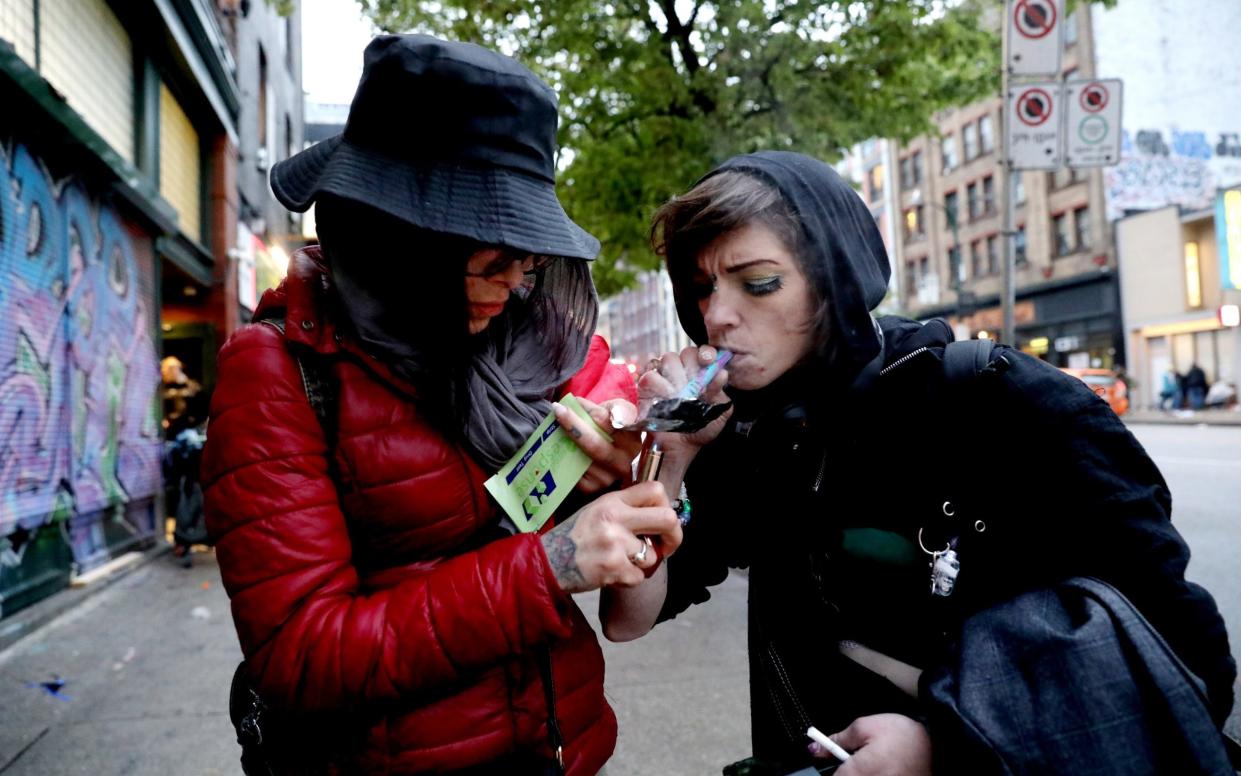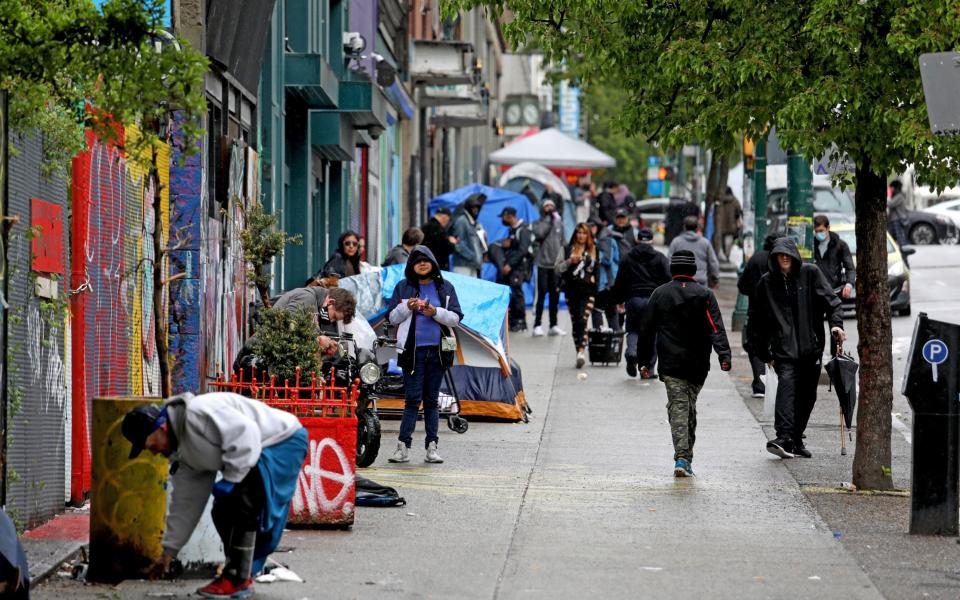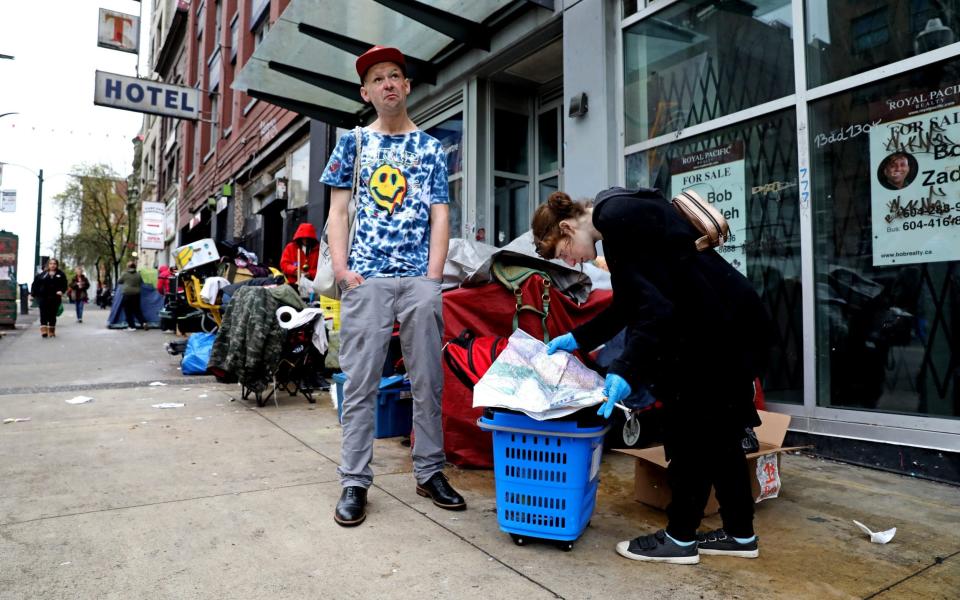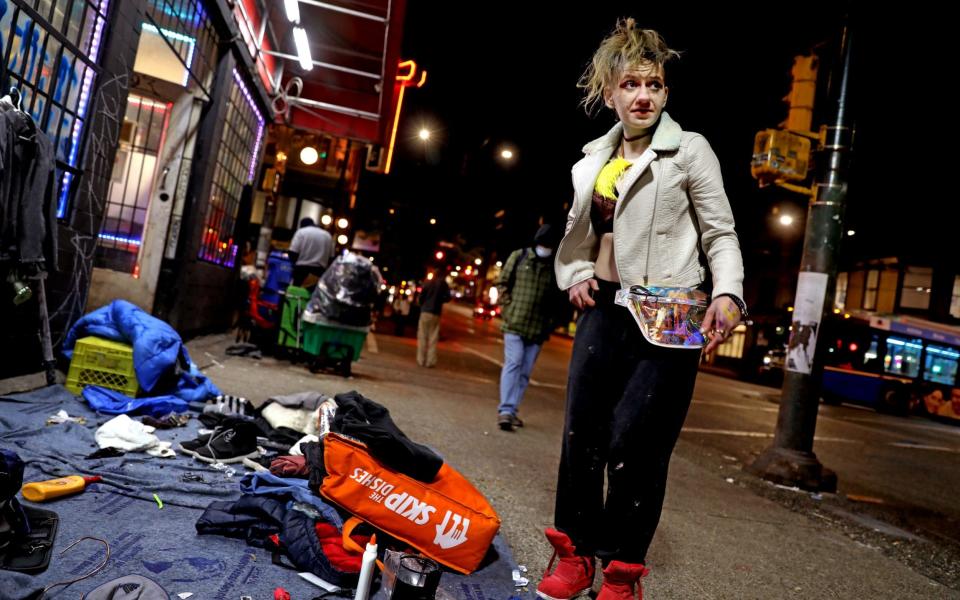I'm holding crack cocaine in my hand - but in Vancouver, the police don't care

At just past 8am I am standing on East Hastings Street in downtown Vancouver with a small packet of crack cocaine in my hand.
Snow is falling gently and dozens, if not hundreds, of drug addicts are already on the move, unbothered when they tread in the human faeces littering the pavement.
Some have already had their fix, and slump lifelessly against shopfronts or slumber in makeshift tents where many stash guns and knives.
In graffiti-covered alleyways, men in hoodies fill syringes with heroin, force the needles into their forearms, and groan as they feed the liquid into their veins.
Women wrapped in blankets - but still shivering from the -1 degree cold - use blow-torch lighters to melt small rocks of crack cocaine before inhaling the fumes through a plastic tube.

Local newspapers describe this street, simply, as “hell”. But the police on patrol simply walk on. In the eyes of the law, as of Tuesday, these people are doing nothing wrong.
Thanks to a radical new policy introduced by British Columbia, one of Canada’s most liberal provinces, adults in possession of 2.5g of heroin, fentanyl, cocaine, methamphetamine or ecstasy will not be arrested or even have their drugs seized.
More than 11,000 British Columbians have died from drug overdoses since a public health emergency was declared in 2016. That’s six people a day for six years in this province of just five million people.

It is time for “a monumental shift in drug policy,” Carolyn Bennett, Canada’s addictions minister, said on Monday.
Her provincial counterpart, Sheila Malcolmson insisted: “Substance use is a public health issue, not a criminal one.”
“By decriminalising people who use drugs, we will break down the stigma that stops people from accessing life-saving support and services.”
The new role of the police in this part of Western Canada is “to redirect people who possess small amounts of certain illegal drugs away from the criminal justice system and towards health and social services,” said Staff Sergeant Kris Clark.
The ultimate goal, Ms Bennett said, “is to save lives”.
In preparation, British Columbia’s 2021 budget pledged $500 million (£304 million) for mental health and substance use services. Of this, $152 million (£92 million) is earmarked for treatment of opioid use disorder specifically, $133 million (£81 million) for treatment and recovery services and $45 million (£27 million) for overdose prevention.

This radical experiment, which has the backing of Justin Trudeau, the prime minister, will last three years.
The Liberal Party leader has said that a similar scheme could be rolled out in other major cities.
“Every step of the way we need to make sure we are following science and data, and that’s what we’re doing. You don’t want to do it without the system and support in place. Of course we’ve heard of cities like Toronto and Edmonton wanting to take this on, and we’re going to work with them every step of the way as, or if, we move forward.”
'It just doesn't make sense'
It has not come without criticism and accusations of double standards. This month, for instance, Canada updated its health guidance to recommend no more than two alcoholic drinks a week. By 2026, any food high in fat, sugar or sodium must have a warning label on the front of its packaging.
James Harry, a former drug addict-turned outreach worker, is baffled by the reform: “We’re giving people the freedom to walk around with that poison in their pockets. It just doesn’t make sense to me.”
“This action will likely result in a dramatic increase in drug use, violence, trafficking and addiction – something that health systems are already overburdened with,” said Jason Kenney, who recently stepped down as Premier of the neighbouring province of Alberta.
Pierre Poilievre, Canada’s Conservative Party leader this week attacked Mr Trudeau’s record saying “after eight years you have given in to Canadian cities that are turning into crime zones”.
Young people previously deterred from taking drugs might now be more inclined to experiment, some health experts fear.
The move also does nothing to tackle the toxicity of the drugs already on the streets. Fentanyl - the synthetic opioid 50 times more potent than heroin - was involved in 87 per cent of overdose deaths in 2021. Sometimes it was cut into other drugs without the user knowing.
As such, some advocates are looking to the government. British Columbia already offers prescriptions of some drugs, including fentanyl, to addicts. Campaigners want to use taxpayer dollars to expand this “safe supply” to other substances.
Jerry Martin, a former drug addict from Vancouver whose brother died from an overdose last year announced plans to open up his own “Drug Store” in the area, so he can sell “clean” drugs to addicts.
It was not immediately clear if he had done so on Tuesday, or if he had been deterred by threats from authorities.
“Mr Martin’s project is not within the scope of decriminalisation,” British Columbia’s Ministry of Health and Addictions said in a statement. “The selling (or trafficking) of controlled substances remains illegal.”

Andy Bhatti, a leading drug addiction interventionist, says the idea is dangerous.
“He is promoting addiction and trafficking. There is absolutely no way he will be able to stay open. If so, every other gangster organised crime group would open up shop as well.
“If we allow stores to sell cocaine, it will be the dumbest thing in the world.”
'These deaths are preventable'
On Tuesday, Chief Coroner Lisa Lapointe announced that 2,272 people died from illicit drugs last year in British Columbia, making it the province's second deadliest year on record. The average age of the victims was 44.
“The reality is that these deaths are preventable,” Ms Lapointe said, as she urged users to seek treatment.
“To the families of the 45 individuals who have passed away in the last week alone ... to their friends and their colleagues and their communities and loved ones: my heart goes out to you and I'm so sorry that we're continuing to fail,” said addiction medicine specialist Dr Paxton Bach during an emotional news conference.
“I hope that we can sit with that grief and that outrage. I hope that every citizen of the province reflects on this report and feels that outrage and uses that to drive the advocacy that is needed to generate change.”
Back on East Hastings street, there is shouting as two men squabble over a lighter. One of them reaches into his waistband and pulls out a knife. The huddle of people gathered around scatters.

I hand the bag of crack back to its owner - Nicole, an addict in her 40s, who fell into drugs, alcohol and depression as a teenager.
Pouring the contents onto a piece of foil and warming it up from below with a lighter, she sighs.
“What hope do we really have anyway? Look at this place.”
After a long drag, she splutters.
“So the police won’t arrest us now? I guess they’ll just be here to help with the bodies.”

 Yahoo News
Yahoo News 
